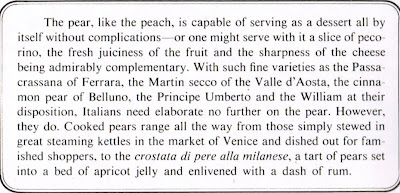 |
| The pear pie from The Best of Italian Cooking, (photograph from the book) |
On Labor Day I decided to bring a favorite dessert to our family barbecue on the Nob, as we call Dick Berendt's San Francisco penthouse high atop Nob Hill. Some luscious, ripe Bartlett pears from Bernie's stand at the Farmer's market were beckoning, and though the author Waverly Root suggests serving them as dessert all by themselves, without complications, I visualized a more impressive creation. So I thumbed through the dessert section of his Best of Italian Cooking and rediscovered this timballo (or dessert pie) embedding pears simmered in red wine and spices in a cornmeal crust.
 |
| California Bartlett pear season is over, so Bernie poses with one of his apples |
I hadn't made this recipe in years and I was hesitant only because I vaguely remembered that the crust was difficult to roll out and transfer to a pie plate. However, since my pie crust skills have improved significantly, I had confidence that this time I would succeed.
 |
| My 1974 copy of the cookbook (first printing) |
I propped the book open to page 258, uncorked a bottle of Dolcetto d'Alba, peeled and chopped Bernie's pears, stuffed the cores and peels in my green bin and simmered the chunks of fruit in a mixture of the red wine, sugar and cinnamon. When the pears were tender and syrupy I let them drain while I tackled the crust.
 |
| So far, so good |
Mixing the cornmeal, flour, and butter in my food processor was routine but, typical of Italian tart crusts, this one called for two eggs, and I added some lemon zest. Then a buzz of the blades while I poured in ice water and the dough came together beautifully. I gathered it into a ball and chilled it hoping for the best.
 |
| My favorite heavy wooden rolling pin and an 8" aluminum pie plate ready for the pie dough |
An hour passed and the time of truth had arrived. I retrieved my wooden board from the pantry, covered it with flour and began rolling with my heavy wooden rolling pin. Cracks and fissures developed soon after I began rolling but I continued, adding more flour, rotating and smoothing out the dough regularly. Instead of mending together, the large cracks made deeper inroads into the surface, and I knew I was in trouble. I had a messy cornmeal disc that was the correct circumference, so I tried to transfer it to my 8" pie pan. It fell to pieces as I struggled to get a spatula underneath, so I plopped the broken dough bits in the pan and pressed them in, crimping the top edge as well as I could. I knew a pressed-in bottom crust would be fine. But what would I do with the top crust?
I filled the dough-lined pie pan with the pink wine-poached pears and rolled out the second half of my sticky cornmeal dough. Unfortunately, the same cracks developed and stubbornly refused to mend. Even thoroughly floured dough stuck to the rolling pin. I would certainly not be able to get a spatula underneath and cover the pears in one solid blanket of dough as instructed. So I found a square metal cookie cutter, cut out 3" pieces of dough and placed them overlapping on top of the pears. That worked quite well and it seemed to be a good solution. The completed pie didn't look too different from the photo in the book.
I baked the pie in a 375 degree oven until golden brown and removed it to cool on a rack before it made the trip to San Francisco.
 |
| Pear timballo with patchwork cornmeal crust |
After dinner we ate slices of the timballo with vanilla ice cream drenched in the sweet winey syrup left over from poaching the pears. The pie was absolutely delicious, and was declared a great success. I guess it was only fitting that I labored a bit on Labor Day

